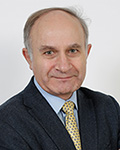Plenary speakers
 |
Tadafumi Adschiri
Adschiri Lab,Tohoku University (Japan)
Prof. Adschiri graduated from The University of Tokyo in 1981, and received his Doctorate in Engineering from the same institution in 1986. He worked as a Special Research Fellow of JSPS (Japan Society for the Promotion of Science), following which he was appointed as an Assistant Professor in The University of Tokyo in 1987. As a visiting scholar, he has had the opportunity to carry out research work at the University of Waterloo (1991, Canada), University of Hawaii (1996, US), and University of Delaware (1997, US). Prior to joining Tohoku University, the primary focus of his research was on coal conversion technology. In 1989, he moved to Tohoku University and began studying reactions in supercritical fluids for biomass conversion, chemical recycling of wastes, new organic reactions, and materials synthesis. He has published nearly 300 papers, with over 10,000 citations, and has an h‐index of over 50. He has been invited more than forty times to major international conferences in a variety of research fields as a plenary/keynote/invited lecture.
For his research excellence, he has been awarded many prizes, including awards from the Chemical Society Japan (Science Award), Society of Chemical Engineering of Japan (Best Research Award, and SCEJ Society Award), Japan Energy Society (Progress Award), etc. In addition to the academic societies, he is the recipient of the honorable Japan Invention Award from the Japanese government and three‐time winner of the Minister’s awards of MEXT (Ministry of Education, Culture, Sports, Science and Technology) as well.
Ten years ago, the Japanese government selected five (now nine) distinguished research teams as part of the World Premier Research Center Initiative (WPI), and he had the honor to be selected as a principal researcher for the Advanced Institute of Materials Research (WPI‐AIMR) in Tohoku University. Currently, Prof. Adschiri serves as the President of ISHA (International Solvothermal Hydrothermal Association) from 2018, Vice President of IASCF (International Society for Advancement of Supercritical Fluids) from 2014, Chairman of the Asian Society of Supercritical Fluids, and President of the Society of Chemical Engineering of Japan (2018).
In 2014 he was assigned as a member of Science Council of Japan (six‐year appointment followed by a conjuncted membership for an additional twelve years). In 2016, he became a member of the Engineering Academy of Japan (life time) . This year Doctor Honoris Causa was given from University of Bordeaux, and Distinguished Professorship from Tohoku University. What is even more noteworthy is the Medal with Purple Ribbon from the Emperor of Japan. |
 |
David Shallcross
Professor and Associate Dean (Academic) in Melbourne School of Engineering, University of Melbourne (Australia).
Professor Shallcross served as Head of the Department of Chemical and Biomolecular Engineering at the University for 6 years. He was also Vice President of the UK-based Institution of Chemical Engineers for 3 years and Editor-in-Chief of the Elsevier journal Education for Chemical Engineers for 9 years. Professor Shallcross has an international reputation in chemical engineering education and has won several national and international awards for his contributions to chemical engineering education including the 2006 Frank Morton Medal of the Institution of Chemical Engineers, the 2010 Caltex Teaching Award of Excellence and the 2013Institution of Chemical Engineers Council Medal.
He has consulted internationally in engineering education and regularly runs workshops on modern engineering education technqiues. His recent book, “Chemical Engineering Explained”, was published in 2018 by the Royal Society of Chemistry and next book, “Petroleum Engineering Explained” is due for publication in 2020.
|
 |
Sergei G. Kazarian
Professor of Physical Chemistry in the Department of Chemical Engineering at Imperial College London, his scientific research began in Armenia using infrared spectroscopy to study matrix isolation of weak complexes of CO2 with metal atoms. The further development of this technique involved the use of liquefied noble gases as novel solvents for chemistry and spectroscopy, which formed the topic of his PhD in 1983-1987 (in Moscow at the Academy of Sciences). He worked as a research fellow at the University of Nottingham, UK and as a research scientist at Georgia Institute of Technology, USA on applications of FTIR and Raman spectroscopy to studies of molecular interactions and the processing of polymeric materials with supercritical CO2. He joined Imperial College London, consistently one of the world’s top ten universities, in 1998 and was promoted to Professor in 2006. He leads a very active research group “Vibrational Spectroscopy and Chemical Imaging”.
He has also been a visiting professor at University of Provence (France), University of Sydney (Australia), University of Bordeaux (France), Kwansei Gakuin University and Tokyo Institute of Technology (Japan). He has a very productive collaboration with the Institute of Catalysis in Novosibirsk (Russia) where he helped to establish the Laboratory of Vibrational Spectroscopy and Chemical Imaging. Professor Kazarian has published nearly 300 articles and reviews in leading scientific journals, which were cited nearly 16000 times. Professor Kazarian is a Fellow of the Royal Society of Chemistry and a Fellow of Society for Applied Spectroscopy. He is Editor in Chief of Applied Spectroscopy. Most of his recent research is focused on FTIR spectroscopic imaging and its applications for characterisation of polymeric, pharmaceutical, forensic and biomedical systems, including in situ of interactions of CO2 with polymers and ionic liquids. His research also encompasses confocal Raman microscopy and tip-enhanced Raman scattering for materials characterisation. He presented his research at the Royal Society’s 350th Anniversary Summer Science Exhibition in 2010 and he was awarded the Royal Society of Chemistry Sir George Stokes Award for his research with ATR-FTIR spectroscopic imaging in 2015.
|
|




